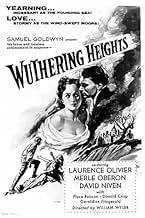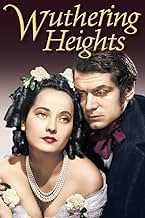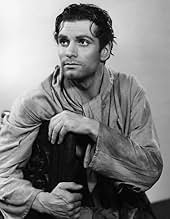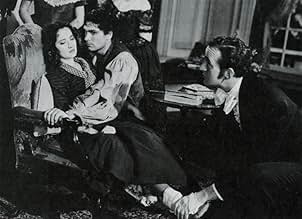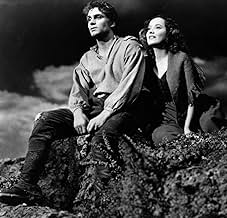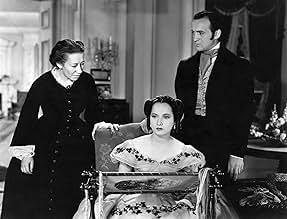ÉVALUATION IMDb
7,5/10
21 k
MA NOTE
Une domestique du domaine des Hauts de Hurlevent raconte à un voyageur le récit tragique des amants Cathy et Heathcliff.Une domestique du domaine des Hauts de Hurlevent raconte à un voyageur le récit tragique des amants Cathy et Heathcliff.Une domestique du domaine des Hauts de Hurlevent raconte à un voyageur le récit tragique des amants Cathy et Heathcliff.
- A remporté 1 oscar
- 9 victoires et 7 nominations au total
Sarita Wooton
- Cathy (as a child)
- (as Sarita Wooten)
Frank Benson
- Heathcliff Servant
- (uncredited)
Romaine Callender
- Robert
- (uncredited)
Richard Clucas
- Little Boy
- (uncredited)
Vernon Downing
- Giles
- (uncredited)
Avis en vedette
Great literature enriches the soul. The Brontes created great literature because they invented so much of what it means. They invented ways of observing the soul that hadn't already been mined by Shakespeare. If you want a great film that celebrates, explores, exploits Bronte, you can't escape the reality that you'd have to stretch film the same way Charlotte stretched perspective.
Didn't happen here. Olivier seemed good enough at what he knew (stage acting) but that isn't bendable to great experiences in film. Never was.
But you might want to watch this for another reason. The dialog and acting are ordinarily conceived. But the cinematography is extraordinary, from the very special Greg Toland. Greg DID stretch cinema in the way we mentioned. His greys have depth. When he photographs the heath, we feel the atmosphere as if the mist had emotion.
The interiors of the house are magnificent in design. And Toland's lighting and framing are so haunting.
This film is why Orson Welles wanted him on "Citizen Kane." You need to watch it to see where much of the disembodied ghost-observer comes from. With Toland, Cathy defines what we see and how.
But the actual story? Go read it instead.
Ted's Evaluation -- 2 of 3: Has some interesting elements.
Didn't happen here. Olivier seemed good enough at what he knew (stage acting) but that isn't bendable to great experiences in film. Never was.
But you might want to watch this for another reason. The dialog and acting are ordinarily conceived. But the cinematography is extraordinary, from the very special Greg Toland. Greg DID stretch cinema in the way we mentioned. His greys have depth. When he photographs the heath, we feel the atmosphere as if the mist had emotion.
The interiors of the house are magnificent in design. And Toland's lighting and framing are so haunting.
This film is why Orson Welles wanted him on "Citizen Kane." You need to watch it to see where much of the disembodied ghost-observer comes from. With Toland, Cathy defines what we see and how.
But the actual story? Go read it instead.
Ted's Evaluation -- 2 of 3: Has some interesting elements.
This classic version of the Bronte novel is probably familiar to most movie fans, and with good reason. Although the recent Ralph Fiennes version is also excellent, nothing can quite surpass the 1939 film's bleak black-and-white cinematography or the impassioned performance of Laurence Olivier. Some of us still mourn that his then-wife, Vivien Leigh, wasn't granted her wish to be cast as Catherine, but Merle Oberon is nonetheless excellent: her Catherine isn't quite likable, but then, she isn't supposed to be. Instead of sugar-coating the story as Hollywood is so wont to do, the filmmakers give us Cathy and Heathcliff as they should be: ruthless, selfish, destructive, and fascinating. The only major drawback is the saccharine musical score, which tries to make this wild, haunting story into a candy-box romance. Fortunately, all the other elements resist this tendency. Even though the film only covers half the novel, you'll find it satisfying and unforgettable.
Director William Wyler and star Laurence Olivier bring to life the atmosphere and most important characters of a classic novel in "Wuthering Heights". While necessarily omitting much of the material for cinematic purposes, and having a slightly different emphasis, the film version will still be appreciated by those who enjoy classic stories.
The Emily Brontë novel on which the film is based is one of the greatest books of its kind. It is far deeper than any film version could be, so for this movie only a portion of the story is used, and several characters are omitted. The movie also has more of a melodramatic feel than did the novel. It does retain the flashback-style of narrative, which works just as well in the film as it did in the book.
The story opens with a weary traveler meeting up with a now-aging, hostile, and excitable Heathcliff (Olivier), after the main action of the story is in the past. Unsettled by this strange man, the traveler is told Heathcliff's story by the housekeeper Ellen (Flora Robson). This begins with Heathcliff's childhood, and goes through his relations with the Earnshaw family and the Linton family. The heart of the story is his troubled romance with Catherine Earnshaw (Merle Oberon), whom he has known since being taken in by her family as a child. This relationship in turn leads to conflicts with most of the other characters, and affects the lives of everyone involved in profound ways.
Olivier memorably portrays this difficult character, and helps the audience feel his longing and restlessness. Oberon is also ideal as Catherine - a mercurial character who is both a complement and a contrast to Heathcliff. The other main strength of the film is its realization of the main settings, which are almost as important to the story as the characters are: once-fine but now gloomy and declining Wuthering Heights; the pleasant but vapid Thrushcross Grange, home of the Linton family; and especially the wild, mysterious Yorkshire moors, the only place where Heathcliff and Cathy are ever really happy. These settings are all effectively created and photographed, and provide an appropriate background to the events and tensions in the characters' lives.
The result is a movie that, while lacking the complexity of the novel, is a satisfying realization of the most important aspects of the book, and which effectively brings the audience into the lives and hearts of the characters.
The Emily Brontë novel on which the film is based is one of the greatest books of its kind. It is far deeper than any film version could be, so for this movie only a portion of the story is used, and several characters are omitted. The movie also has more of a melodramatic feel than did the novel. It does retain the flashback-style of narrative, which works just as well in the film as it did in the book.
The story opens with a weary traveler meeting up with a now-aging, hostile, and excitable Heathcliff (Olivier), after the main action of the story is in the past. Unsettled by this strange man, the traveler is told Heathcliff's story by the housekeeper Ellen (Flora Robson). This begins with Heathcliff's childhood, and goes through his relations with the Earnshaw family and the Linton family. The heart of the story is his troubled romance with Catherine Earnshaw (Merle Oberon), whom he has known since being taken in by her family as a child. This relationship in turn leads to conflicts with most of the other characters, and affects the lives of everyone involved in profound ways.
Olivier memorably portrays this difficult character, and helps the audience feel his longing and restlessness. Oberon is also ideal as Catherine - a mercurial character who is both a complement and a contrast to Heathcliff. The other main strength of the film is its realization of the main settings, which are almost as important to the story as the characters are: once-fine but now gloomy and declining Wuthering Heights; the pleasant but vapid Thrushcross Grange, home of the Linton family; and especially the wild, mysterious Yorkshire moors, the only place where Heathcliff and Cathy are ever really happy. These settings are all effectively created and photographed, and provide an appropriate background to the events and tensions in the characters' lives.
The result is a movie that, while lacking the complexity of the novel, is a satisfying realization of the most important aspects of the book, and which effectively brings the audience into the lives and hearts of the characters.
SPOILERS Out of the cinematic versions of Emily Bronte's incredible tale, this 1939 version is one of the furthest from it. However, as a piece of cinematic art, it is the finest, a shining example of Hollywood craftmanship made at a time when so many classic movies were being churned out. Producer Sam Goldwyn said it was the best movie he ever made. It's certainly director William Wyler's best film, and that includes Ben Hur. While Bronte's novel is a lot more than just a love story, this almost reduces it to being just a love story. Never mind, because as a love story, this film works wonderfully. Like almost all great love stories, it's gloriously romantic, emotionally intense and ultimately incredibly moving.
The controversial decision to miss out almost the entire second half of the book allowed the filmmakers to concentrate on the Heathcliff/Cathy love story, and Laurence Olivier and Merle Oberon both have incredible chemistry and strengh in their performances. No, they are not Bronte's characters, especially the film's version of Heathcliff, who here is FAR too nice, but are definitely one of the greatest of Hollywood's cinematic couples. This is especially notable in the scenes set on the moors, where we are definitely in that Olde Hollywood romantic never never land where the music soars and passion had to be, and was, encapsulated in a kiss. Olivier is impressive delivering some of Bronte's lines, of which there are a surprising amount, and the film does follow the book's plot very closely, it just tones down the darkness.
There are many superbly done sequences- the incredibly atmospheric opening where a traveller arrives at Heathcliff's house, all the scenes on the moors, Cathy's speech to Nelly "I AM Heathcliff", and of course, more than any other scene, the death of Cathy. As Heathcliff takes the dying Cathy to the window to see the moors once more and she finally dies virtually standing up, all the while while Alfred Newman's love theme plays and plays. This is one of the moving and also one of the most beautiful and artistic deaths in Hollywood history, all the more powerful for actually being comparatively understated by Hollywood standards of the time. Only those who had read the book or knew of the missing second half would know there was more in the story to come, in the context of the film the tale seems complete. Some don't like the final scene of Heathcliff and Cathy's ghosts wondering in the snow, but it is actually closer to the book's actual ending than most seem to admit. It's also one of the best tearjerkers ever, period.
Most people read the book and are than disappointed when they see this. It's therefore best to see this first, and to appreciate it as one of the great Hollywood love stories, before THAN reading the book. Yes, the book is still better, but than most books are.
The controversial decision to miss out almost the entire second half of the book allowed the filmmakers to concentrate on the Heathcliff/Cathy love story, and Laurence Olivier and Merle Oberon both have incredible chemistry and strengh in their performances. No, they are not Bronte's characters, especially the film's version of Heathcliff, who here is FAR too nice, but are definitely one of the greatest of Hollywood's cinematic couples. This is especially notable in the scenes set on the moors, where we are definitely in that Olde Hollywood romantic never never land where the music soars and passion had to be, and was, encapsulated in a kiss. Olivier is impressive delivering some of Bronte's lines, of which there are a surprising amount, and the film does follow the book's plot very closely, it just tones down the darkness.
There are many superbly done sequences- the incredibly atmospheric opening where a traveller arrives at Heathcliff's house, all the scenes on the moors, Cathy's speech to Nelly "I AM Heathcliff", and of course, more than any other scene, the death of Cathy. As Heathcliff takes the dying Cathy to the window to see the moors once more and she finally dies virtually standing up, all the while while Alfred Newman's love theme plays and plays. This is one of the moving and also one of the most beautiful and artistic deaths in Hollywood history, all the more powerful for actually being comparatively understated by Hollywood standards of the time. Only those who had read the book or knew of the missing second half would know there was more in the story to come, in the context of the film the tale seems complete. Some don't like the final scene of Heathcliff and Cathy's ghosts wondering in the snow, but it is actually closer to the book's actual ending than most seem to admit. It's also one of the best tearjerkers ever, period.
Most people read the book and are than disappointed when they see this. It's therefore best to see this first, and to appreciate it as one of the great Hollywood love stories, before THAN reading the book. Yes, the book is still better, but than most books are.
10jotix100
"Wuthering Heights", based on the novel by Emily Bronte, gets a first rate treatment from its director, the genial William Wyler. The adaptation was done by Charles McArthur and Ben Hecht, two of the best writers working in the Hollywood of that era. The great cinematography by Gregg Toland makes it visually stunning. Alfred Newman's music score plays in the background, making this film a classic that will be cherished by movie lovers.
Some comments to this forum express their displeasure in the adaptation one sees on the screen. Most people forget what a task it must have been to get the essence of the Bronte novel in a cinematic form, something the adapters did with elegance and charm.
The cast that was assembled for "Wuthering Heights" is a dream come true. Presenting the young Merle Oberon in all her beauty makes one almost fall instantly in love with her. Ms. Oberon had a fantastic presence, which translated in probably her best work in films.
The dashingly handsome Laurence Olivier as Heathcliff, creates the right chemistry against Ms. Oberon's Cathy. Mr. Olivier was at the pinnacle of his career. He responds well to Mr. Wyler's direction. His Heathcliff shows a mean streak, but over all, Olivier gives an impressive performance.
David Niven is excellent as Edgar Linton, the man who wins Cathy's heart with his kindness. Flora Robson does also an outstanding job as Ellen, the housekeeper, who serves as the narrator. The young and beautiful Geraldine Fitzgerald makes a brilliant Isabella.
The rest of the players are equally wonderful, Donald Crisp, Hugh Willimas, Leo G. Carroll, Cecil Kellaway, made contributions to the movie.
Ultimately, this film is a love story doomed from the beginning. This tale of the passion between the lovers in the moors is a perfect way to lose oneself in the magic of the movies.
Some comments to this forum express their displeasure in the adaptation one sees on the screen. Most people forget what a task it must have been to get the essence of the Bronte novel in a cinematic form, something the adapters did with elegance and charm.
The cast that was assembled for "Wuthering Heights" is a dream come true. Presenting the young Merle Oberon in all her beauty makes one almost fall instantly in love with her. Ms. Oberon had a fantastic presence, which translated in probably her best work in films.
The dashingly handsome Laurence Olivier as Heathcliff, creates the right chemistry against Ms. Oberon's Cathy. Mr. Olivier was at the pinnacle of his career. He responds well to Mr. Wyler's direction. His Heathcliff shows a mean streak, but over all, Olivier gives an impressive performance.
David Niven is excellent as Edgar Linton, the man who wins Cathy's heart with his kindness. Flora Robson does also an outstanding job as Ellen, the housekeeper, who serves as the narrator. The young and beautiful Geraldine Fitzgerald makes a brilliant Isabella.
The rest of the players are equally wonderful, Donald Crisp, Hugh Willimas, Leo G. Carroll, Cecil Kellaway, made contributions to the movie.
Ultimately, this film is a love story doomed from the beginning. This tale of the passion between the lovers in the moors is a perfect way to lose oneself in the magic of the movies.
Le saviez-vous
- AnecdotesLaurence Olivier found himself becoming increasingly annoyed with director William Wyler's exhausting style of filmmaking. After yet another take, he is said to have exclaimed, "For God's sake, I did it sitting down. I did it with a smile. I did it with a smirk. I did it scratching my ear. I did it with my back to the camera. How do you want me to do it?" Wyler's retort was, "I want it better." However, Olivier later said these multiple takes helped him learn to succeed as a movie actor.
- GaffesThough the social situations, and even the soundtrack, are consistent with the novel's timeframe of 1770-1801, the Colonial/Napoleonic era, the costumes are an odd mix of mid-Victorian and American Civil War.
- Citations
Heathcliff: Catherine Earnshaw, may you not rest so long as I live on! I killed you. Haunt me, then! Haunt your murderer! I know that ghosts have wandered on the Earth. Be with me always. Take any form, drive me mad, only do not leave me in this dark alone where I cannot find you. I cannot live without my life! I cannot die without my soul.
- Générique farfeluOpening credits prologue: On the barren Yorkshire moors in England, a hundred years ago, stood a house as bleak and desolate as the wastes around it. Only a stranger lost in a storm would have dared to knock at the door of Wuthering Heights.
- Autres versionsThere is an Italian edition of this film on DVD, distributed by DNA Srl: "CIME TEMPESTOSE (1939) + ORGOGLIO E PREGIUDIZIO (1940)" (2 Films on a single DVD), re-edited with the contribution of film historian Riccardo Cusin. This version is also available for streaming on some platforms.
- ConnexionsFeatured in AFI Life Achievement Award: A Tribute to William Wyler (1976)
- Bandes originalesPiano Sonata in A major, K.331: Rondo alla Turca
(1778) (uncredited)
Music by Wolfgang Amadeus Mozart
Played by Alice Ehlers on harpsichord
Meilleurs choix
Connectez-vous pour évaluer et surveiller les recommandations personnalisées
- How long is Wuthering Heights?Propulsé par Alexa
- What is 'Wuthering Heights' about?
- Is 'Wuthering Heights' based on a book?
- What does 'wuthering' mean?
Détails
- Date de sortie
- Pays d’origine
- Site officiel
- Langue
- Aussi connu sous le nom de
- Cumbres borrascosas
- Lieux de tournage
- société de production
- Consultez plus de crédits d'entreprise sur IMDbPro
Box-office
- Brut – États-Unis et Canada
- 624 643 $ US
- Fin de semaine d'ouverture – États-Unis et Canada
- 15 493 $ US
- 9 avr. 1989
- Brut – à l'échelle mondiale
- 624 643 $ US
- Durée1 heure 44 minutes
- Couleur
- Rapport de forme
- 1.37 : 1
Contribuer à cette page
Suggérer une modification ou ajouter du contenu manquant



